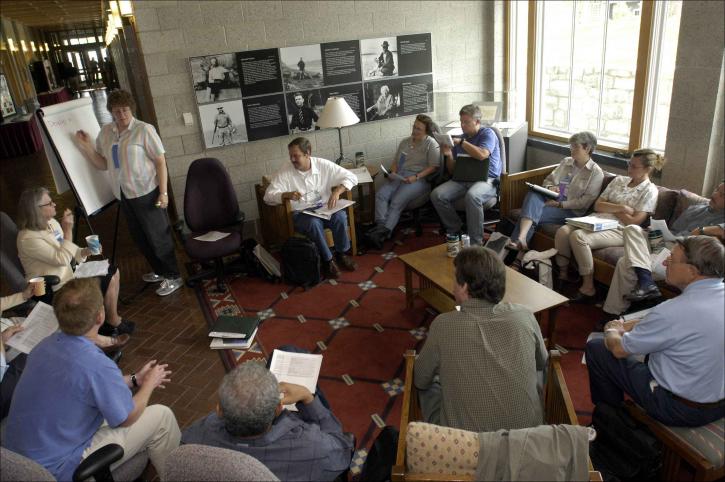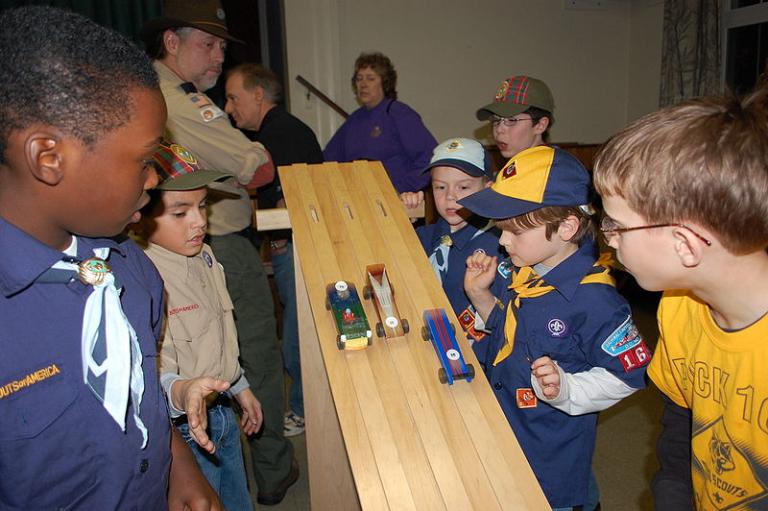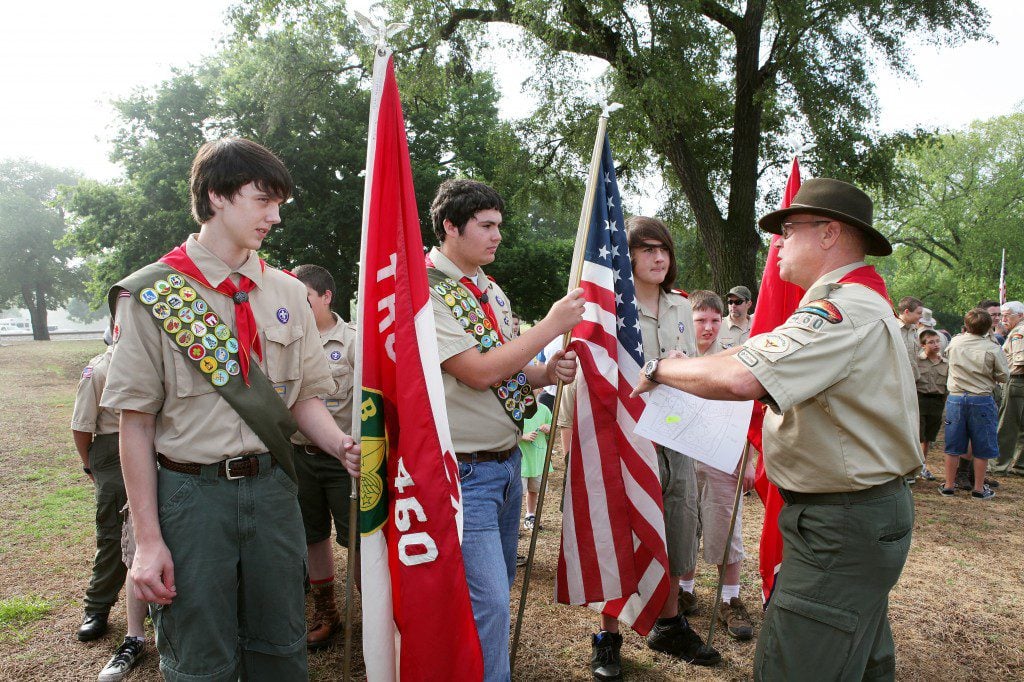
What is CFM?
CFM stands for Christian Family Movement, though it’s specifically a Catholic group. I can’t find a history of the group on the CFM website, but Wikipedia has an entry which explains that they were founded in the 1940s. The idealized CFM group is a group of families at a parish who meet regularly to discuss Christian teaching and social topics, then engage in group “actions” in response. In many respects, it’s a form of “small groups” that existed before “small groups” became popular, though with couples rather than a men’s group or a women’s group. At my parish, it has become “how we do small groups,” has historically been the largest way that people get involved in the parish and get to know other people, and has not changed in years and years except for shrinking: groups meet in members’ homes once a month on Friday nights, and on a monthly or bimonthly basis there are activities with all groups combined — though it used to be, seems to me, a dozen group and now there are half that many, and likewise, there used to be significantly more all-group activities than now as a result. Oh, and the attendance at the groups is much shrunken, as if increasing numbers of nominal members think they’re doing a good deed by joining but aren’t actually interested in attending meetings. In particular, the groups are getting greyer, with relatively fewer younger couples participating, and I’ve been trying to think through what can be done to either “fix CFM” or replace it, and have had some conversations to that effect.
Now, I know your response is to say, “Jane, you should step up, if things have gone off the rails.”
But I know the reality of what I can and can’t do. I can think through and try to tackle a problem. I can put together an excel file calculating pension liabilities. I can remember to submit a donut order (most of the time) and scrape together enough people to serve Sunday morning donuts. I am terrible at organization, in a way that, yes, increasingly worries me, because I am now realizing that I have to fix this about myself before old age sets in, and instead I seem to be getting more scatter-brained. I am also introverted and really not a fan of social gatherings, or at least the part of them that consists of mingling and trying to find people to talk to when everyone else already knows each other and is engaged in conversations with each other and I identify with people On The Spectrum, as they say, though I am not one myself (yes, it takes more than “not fitting in” to have an actual autism diagnosis).
So the best I can do, at least for the moment, is try to think through what could be done.
Why has participation in CFM declined? I would put it at some combination of the following:
Declining numbers of parishioners in general. I don’t have counts, but Sunday attendance and weekly collections are both way down, as are the number of kids in the parish school as well as those who participate in religious ed. Why that is, is probably a combination of overall trends, as well as general weaknesses in the parish leadership, both professional and volunteer. Even though the parishes in town are supposed to be working together, it’s my understanding that the parish just to the north of us is, well, kicking our butts. Used to be, they were very progressive (small church building which when they grew with suburbanization they supplemented and eventually mostly replaced with mass-in-the-gym, entirely contemporary music, laypeople giving homilies labelled “reflections,” changes in the liturgical text, etc.) so we had a comparative advantage in being more traditional, but now they have a new pastor, they have perpetual adoration, they are actually expanding their church building so as to actually worship in a church,
Organizational weaknesses. There have been good intentions to promote CFM that have fallen by the wayside. The all-group events have been disorganized, both in terms of the events themselves and the planning and communication around them. “Actions” — that is, service projects, collections of goods for donation, and what-not, have diminished substantially relative to what was the case early on in our years in the group, mostly, I assume, due to lack of people able and willing to take on the coordination. It’s tempting to say, “hey, [person holding this role], you shouldn’t have taken on this job if you weren’t willing to do the work!” but I suspect that at least in some cases, they’d respond with not, “hey, I just wanted all the recognition that comes with taking on this job without putting in any effort” but “I know I’m not a great fit but at least I stepped up when no one else would.” And, really, if the group is half the size, your talent pool has shrunk, too.
Declining interest in CFM as it functions now among those families who continue to attend mass or would otherwise be receptive. This is where I’m asking myself more general questions, like:
What do people really want from CFM?
What would make it a meaningful experience for them?
How many people do it because they get a lot out of it, vs. participating out of a sense of obligation?
What logistical barriers are there, and how many people would like to participate if logistical barriers could be removed?
To start with the last of these first, whenever over the past several years I have raised concerns about barriers to participation, I get nowhere. It’s a combination of “that’s how we’ve always done it” paired with “this is the Right Way to do it and people should be willing to make this sacrifice.” Some examples: as practiced at our parish, CFM groups intentionally mix together people of all ages and life stages (as opposed, say, to a Young Moms’ group or a senior group or whatever), but, as far as I can tell, this just doesn’t seem to work any longer, because there are so few young couples that they feel out of place. I suggested some years ago that some consideration be given to offering a “young couples only” group for those who would feel more comfortable with this format and it was totally rebuffed. Another time, I suggested that if Friday nights just don’t work for parishioners who would otherwise be interested in participating, that people could be offered the choice of an alternate time, say, for instance, Sundays after the late-morning mass, perhaps paired with pizza and a babysitter/babysitting room. Nope. Maybe the group I was talking to didn’t understand that my suggestion was for an alternative time for those interested, rather than wholly changing all the groups, but I was left with the impression that there was a general unwillingness coming from an attitude that “part of what makes use as CFM participants so great is that we sacrifice our Friday nights when we’d otherwise rather be going out or staying in and curled up on the couch after a long week, so we can’t change that.” It reminds me a bit of when the Society of Actuaries changed the structure of its exams a while back (after I had finished the exams already) and there was some resistance along the lines of “I struggled and took years more than it was supposed to take, to pass the exams, so the next generation shouldn’t have it any easier.” (FYI: I took years longer than it should have, but I had babies and morning sickness in the way.)
The booklets which are used to structure the meeting (which are published by the national organization) also have simply changed in style. The general structure is a combination of scripture and “social inquiry”-type readings with discussion questions, which is fine and actually fairly suitable for this sort of group insofar as it enables discussion without requiring that any one member of the group be an expert as might be the case, say, for a Bible study in which a leader is expected to be able to provide guidance. (Maybe this isn’t really the case and Bible studies the world over use discussion guides which circumvent this just as well.) But the chapters are just not as well written as they used to be, and maybe that’s simply a matter of having lost a few members with that skill set having left for whatever reason and the new volunteer writers and editors lacking that skill. The latest batch of authors like to use the “what word or phrase spoke to you?” type of discussion-starter, which I always cringe at. The “action” part also used to list suggestions for activities one might do as an individual, couple, or family, but lately these have been much more specific and prescriptive for the entire group, which just isn’t in keeping with the way it works at our parish at all. (Maybe it should be, and maybe the groups should, as individual groups, concretely plan outreach activities, but that’s not what happens.)
Now, there are a lot of elements to CFM that are valuable, but I think what people appreciate most is the way it offers a means of getting “hooked into” the parish, and there are other structures to accomplish that. To be honest, I’d also prefer something that involved less small talk, even if it’s a couples’ euchre group or the like (and even an idealized CFM group might be something I’d want to take a break from as I’m becoming less and less willing to repeatedly be on the fringes of someone else’s conversation or to offer the same statements of how my son is liking college). If the parish tradition of “we do CFM” prevents the parish from offering experiences to (prospective) participants that are meaningful to them, that’s a problem, yet my core assumption is that it would be an absolute non-starter to say “we need to jettison CFM” because so many of the people who control decisionmaking take such pride in its history at our parish.
So that’s my sort of long and rambling effort to sort through the issue, and, as usual, comments are great but I do this sort of thing because it helps me to think through it even though I don’t have any next-steps figured out.
Image: https://pixnio.com/people/people-in-small-discussion-group-meeting
This is not actually a CFM meeting. We don’t use whiteboards, we don’t meet in lounge areas of larger buildings, we sit as couples and generally have snacks and wine glasses. But it’s close enough.












